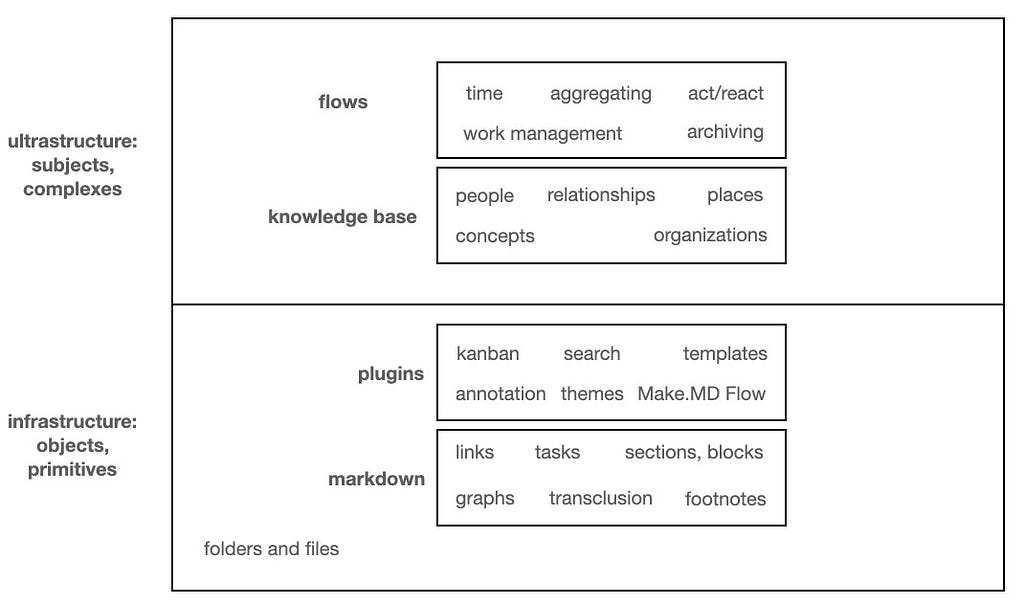Folio
How Obsidian notetaking becomes knowledge
I have been deep in the details of developing a course in collaboration with Dave Gray and others at the School of the Possible. Next week, ten course developers (including me) will participate in an Open House, on Wednesday, March 6th, from 9 to 10:30 AM Pacific. Click on the link for more information.
My course was initially focused on a fairly small-bore topic: decision-making. But after hammering out a description and plan of attack for such a thing, I reconsidered.
Instead, I’ve switched my focus to something I have been working on, personally, for decades (yes, decades). So, next week’s event will be the debut of something very different, a course I am developing on what can be called ‘networked notetaking’ with a system I call Folio.
Please join us so that I can test some of my thinking about the course with others who are interested in the topic.
Folio: The Course
People have used notetaking for centuries to accumulate insights, ideas, quotes, and drawings with the end goal of capturing a body of knowledge in search of consilience: the aspiration that the cross-pollination of these various perhaps initially unrelated snippets can lead to spontaneous and unforeseen breakthroughs. Breakthroughs in both personal understanding and perhaps in the advancement of ongoing explorations in science, art, and social relations, individually and communally.
The rise of digital notetaking systems has amplified these aspirations, and provide means to push notetaking to new levels of sophistication and greater depth of understanding for users. However, the effective use of a notetaking systems like Obsidian, Notion, Roam Research and others requires more that reading the manual and jumping in.
Stowe will explore the practice and principles of networked notetaking through Folio, a system that has grown from his decades-long exploration of notetaking tools and systems, such as Evernote, Dropbox Paper, Notion, Typora, Dynalist, and others, too many to list.
We have not yet scheduled the course.
What this course is not
This is not an introduction to Obsidian. To appreciate this course, attendees should be fairly well-versed in the use of Obsidian and have a general understanding of its capabilities, such as plugins, css snippets, the use of folders and files, transclusion (such as ![[2029-02-28^label]]), and models of use, like daily notes. (If you aren’t reasonably confident of these terms, you may need to catch up with some of the excellent YouTube videos out there.)
This course also does not include a comprehensive survey of other approaches to networked notetaking, like PARA, Johnny Decimal, or ACE.
And lastly, this course does not compare and contrast alternative platforms to Obsidian, like Notion, Tana, Roam, or any of the dozen or so alternatives.
About your instructor
Stowe Boyd is the chief scientist of Work Futures, and the editor of the Work Futures, and Workings, a newsletter focused on networked notetaking and related topics. Stowe has had many careers over the past 40 years: programming language designer, software entrepreneur, tech analyst, writer, and thought leader. Stowe has taught computer science at Boston University and UC Irvine, as well as programs for organizations as diverse as the American Marketing Association, Harvard’s Berkman Center, and the Association for Computing Machinery. He has presented internationally on topics as broad as compiler design, social tools for the enterprise, and social media. Stowe coined the word ‘hashtag’ in 2007, and is now a footnote in The Oxford English Dictionary and a Jeopardy answer. Stowe is quite active on Twitter and Substack.
Some of what you will learn includes a condensed history of notetaking, and its transition with the advent of digital notetaking, and the practical realization of notetaker’s goals in Folio. What are the objects, subjects, and relationships that comprise Folio’s infrastructure in Obsidian? Why is our experience of time — in the succession of days, weeks, months, and years — central to Folio’s flow? How does Folio support a knowledge base, and the accumulation and application of nodes in a knowledge graph? How does Folio support project-based work? How will Folio accommodate the inevitable transition to a multi-user generation of Obsidian?
A 5-week course
1 hour of class time per week
1 hour average homework per week
Enrollment limited to 20 students
$500 per student for the class
$350 early-bird registration
$150 to follow the class by receiving class videos and homework by email.
Course materials:
Various papers and articles.
An Obsidian vault configured to support Folio, with plugins, snippets, and folder organization. (For the registered students. The Folio vault will also be available for a small fee for others.)
Syllabus
Pre-course work
Week 1. TBD
Week 2. TBD
Week 3. TBD
Week 4. TBD
Week 5. TBD
Post-course follow-up


